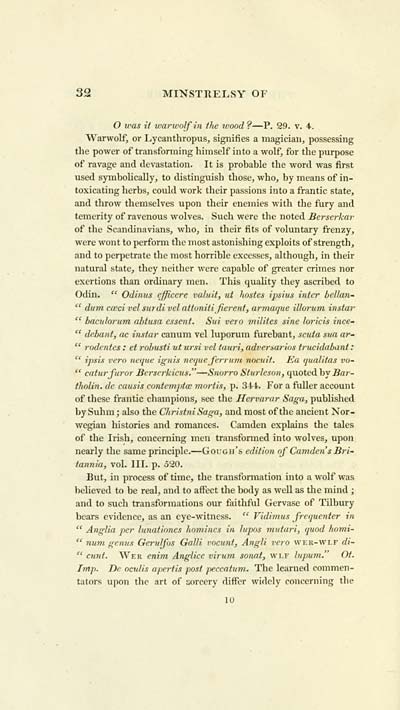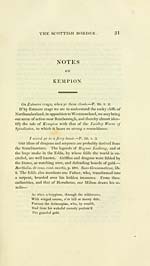Download files
Complete book:
Individual page:
Thumbnail gallery: Grid view | List view

32 MINSTRELSY OF
O was it wai-wolfin ihe ivood ? — P. 29. v. 4..
Warwolf, or Lycanthropus, signifies a magician, possessing
the power of transforming himself into a wolf, for the purpose
of ravage and devastation. It is probable the word was first
used symbohcally, to distinguish those, who, by means of in-
toxicating herbs, could work their passions into a frantic state,
and throw themselves upon their enemies with the fury and
temerity of ravenous wolves. Such were the noted Berserkar
of the Scandinavians, who, in their fits of voluntary frenzy,
were wont to perform the most astonishing exploits of strength,
and to perpetrate the most horrible excesses, although, in their
natural state, they neither were capable of greater crimes nor
exertions than ordinary men. This quality they ascribed to
Odin. " Odinus efficere valuit, ut hostes ipsius inter bellan-
" dum cwci vel mrdi vel attonitifierent, armaque illorum instar
" bacnhj'um abtusa essent. Sui vero milites sine loricis ince-
" debant, ac instar canum vel luporum furebant, sctita sua ar-
" I'odentes : et robusti ut ursi vel lauri, adversarios t7-ucidabant :
" ipsis vero neque ignis neque ferrtmi nocnit. Ea qualitas vo-
" cntur furor Berse7'kicus." — Snorro Stu?-leson, quoted hy Bar-
tholin, dc causis contemjita; ynortis, p. Sil. For a fuller account
of these frantic champions, see the Hervarar Saga, published
by Suhm ; also the Christni Saga, and most of the ancient Nor-
wegian histories and romances. Camden explains the tales
of the Irish, concerning men transformed into wolves, upon
nearly the same principle. — Gough's edition of Camden s Bri-
tannia, vol. III. p. 520.
But, in process of time, the transformation into a wolf was
believed to be real, and to affect the body as well as the mind ;
and to such transformations our faithful Gervase of Tilbury
bears evidence, as an eye-witness. " Vidimus frequenter in
" Anglia per lunationes homines in lupos mutari, quod homi-
" num genus Gerulfos Galli vocunt, Angli veio vver-wlf di~
" cunt. Wer enim Anglice virum sonat, wlf hipum." Ot.
Imp. De oculis apertis post peccatum. The learned commen-
tators upon the art of sorcery differ widely concerning the
O was it wai-wolfin ihe ivood ? — P. 29. v. 4..
Warwolf, or Lycanthropus, signifies a magician, possessing
the power of transforming himself into a wolf, for the purpose
of ravage and devastation. It is probable the word was first
used symbohcally, to distinguish those, who, by means of in-
toxicating herbs, could work their passions into a frantic state,
and throw themselves upon their enemies with the fury and
temerity of ravenous wolves. Such were the noted Berserkar
of the Scandinavians, who, in their fits of voluntary frenzy,
were wont to perform the most astonishing exploits of strength,
and to perpetrate the most horrible excesses, although, in their
natural state, they neither were capable of greater crimes nor
exertions than ordinary men. This quality they ascribed to
Odin. " Odinus efficere valuit, ut hostes ipsius inter bellan-
" dum cwci vel mrdi vel attonitifierent, armaque illorum instar
" bacnhj'um abtusa essent. Sui vero milites sine loricis ince-
" debant, ac instar canum vel luporum furebant, sctita sua ar-
" I'odentes : et robusti ut ursi vel lauri, adversarios t7-ucidabant :
" ipsis vero neque ignis neque ferrtmi nocnit. Ea qualitas vo-
" cntur furor Berse7'kicus." — Snorro Stu?-leson, quoted hy Bar-
tholin, dc causis contemjita; ynortis, p. Sil. For a fuller account
of these frantic champions, see the Hervarar Saga, published
by Suhm ; also the Christni Saga, and most of the ancient Nor-
wegian histories and romances. Camden explains the tales
of the Irish, concerning men transformed into wolves, upon
nearly the same principle. — Gough's edition of Camden s Bri-
tannia, vol. III. p. 520.
But, in process of time, the transformation into a wolf was
believed to be real, and to affect the body as well as the mind ;
and to such transformations our faithful Gervase of Tilbury
bears evidence, as an eye-witness. " Vidimus frequenter in
" Anglia per lunationes homines in lupos mutari, quod homi-
" num genus Gerulfos Galli vocunt, Angli veio vver-wlf di~
" cunt. Wer enim Anglice virum sonat, wlf hipum." Ot.
Imp. De oculis apertis post peccatum. The learned commen-
tators upon the art of sorcery differ widely concerning the
Set display mode to: Large image | Transcription
Images and transcriptions on this page, including medium image downloads, may be used under the Creative Commons Attribution 4.0 International Licence unless otherwise stated. ![]()
| Early Gaelic Book Collections > J. F. Campbell Collection > Minstrelsy of the Scottish border > Volume 3 > (44) |
|---|
| Permanent URL | https://digital.nls.uk/80620912 |
|---|
| Description | Vol III. |
|---|---|
| Shelfmark | Cam.2.d.19 |
| Attribution and copyright: |
|
| Description | Volumes from a collection of 610 books rich in Highland folklore, Ossianic literature and other Celtic subjects. Many of the books annotated by John Francis Campbell of Islay, who assembled the collection. |
|---|
| Description | Selected items from five 'Special and Named Printed Collections'. Includes books in Gaelic and other Celtic languages, works about the Gaels, their languages, literature, culture and history. |
|---|

